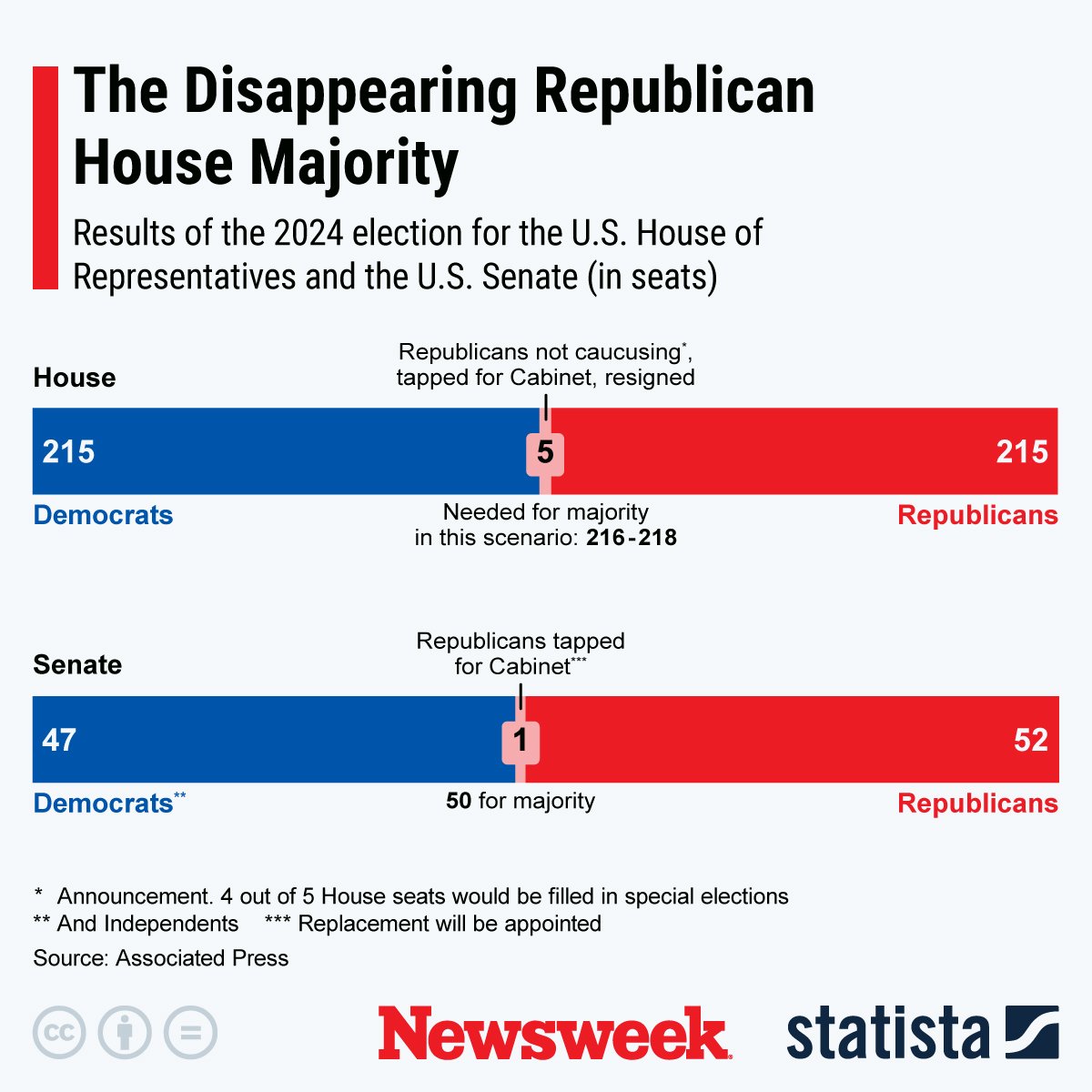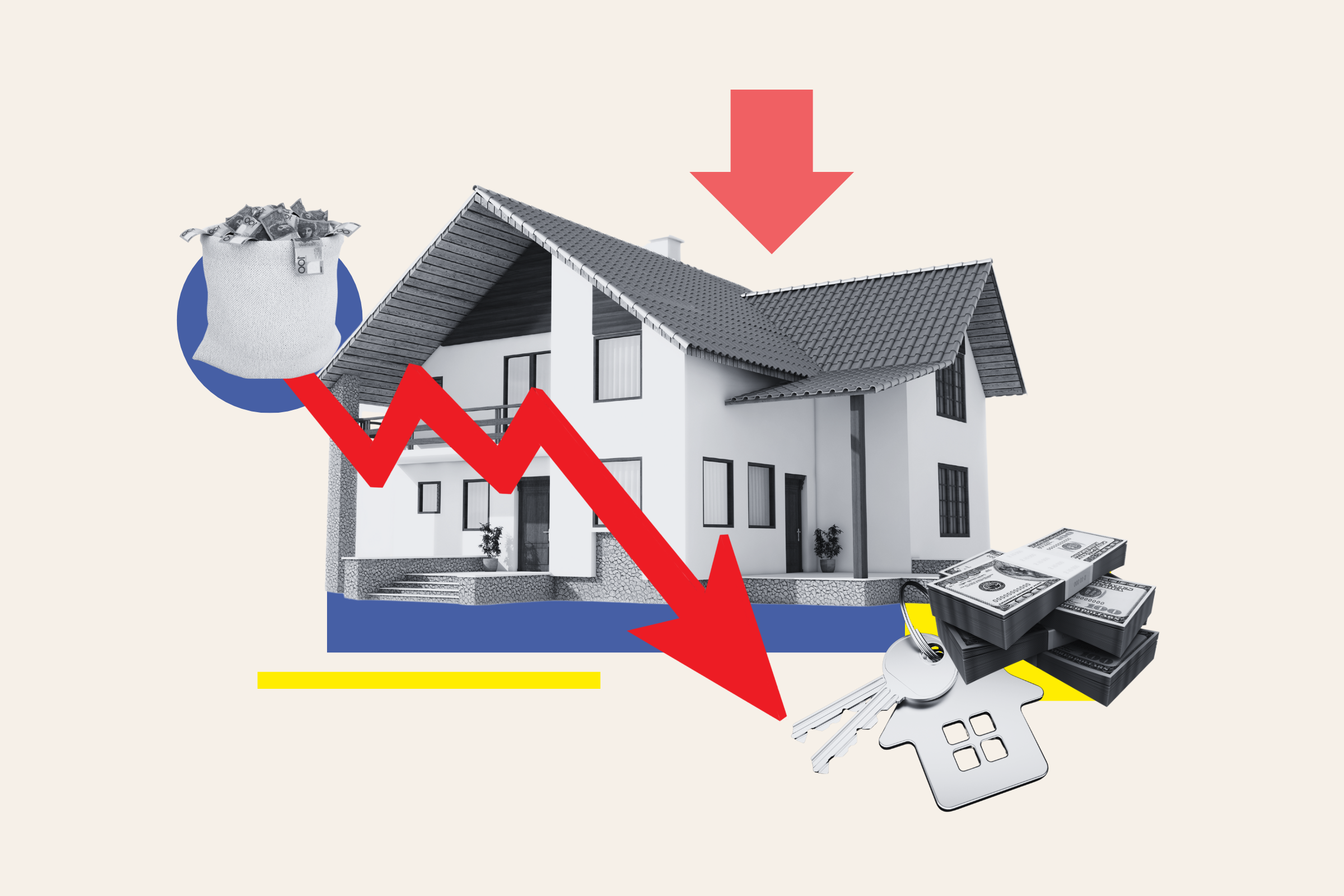🎙️ Voice is AI-generated. Inconsistencies may occur.
What's New
The Republican wafer-thin majority in the House of Representatives is facing growing uncertainty as GOP members of Congress line up for Donald Trump's Cabinet.
Representative Victoria Spartz, an Indiana Republican, announced on Monday that she would no longer "sit on committees or participate in the [Republican] caucus" so she could dedicate more time to the newly created Department of Government Efficiency (DOGE), headed by Elon Musk and Vivek Ramaswamy.
"I will stay as a registered Republican, but will not sit on committees or participate in the caucus until I see that Republican leadership in Congress is governing. I do not need to be involved in circuses. I would rather spend more of my time helping @DOGE and @RepThomasMassie to save our Republic, as was mandated by the American people," she said in a post on X, formerly Twitter.
In another post, Spartz added, "@realDonaldTrump, @elonmusk and @VivekGRamaswamy are our only hope to drain the swamp through reconciliation, and we can come up with more than $2T to fully offset tax cuts. The swamp is very deep, @DOGE!"
Newsweek has contacted Representative Spartz for comment via email.

Why It Matters
While some Republicans were confused by Spartz's decision on Monday, it allegedly came in response to the House GOP Steering Committee not giving her a sought-after post on the House Ways and Means Committee, sources told Politico.
Spartz's move could throw the slim Republican majority in the House into peril amid other GOP members of the House being tapped to serve in Trump's Cabinet.
These include Matt Gaetz, who has already resigned after being picked for the role of attorney general, a position from which he later withdrew. Meanwhile, Representatives Mike Waltz of Florida and Elise Stefanik of New York are in line for national security adviser and U.S. ambassador to the United Nations respectively. Representative Lori Chavez-DeRemer of Oregon has also been nominated to serve as labor secretary.
All the vacant seats will be filled by special elections, the date of which will be set by the governors of each state. No date has yet been announced for the special elections, other than in Florida, where one has been called for January 28 to fill Gaetz's seat.
The seat is rated as solid Republican by Cook Political Report. Gaetz won reelection in November by more than 30 points.

This chart, provided by Statista, shows the results of the 2024 election for the U.S. House of Representatives and the U.S. Senate (in seats).
What To Know
The Republicans are set to control the House in January's new Congress with a slim five-seat majority of 220 to the Democrats' 215 seats, but passing legislation in the House requires a simple majority of 218 votes. If lawmakers are absent due to illness or other reasons, however, the majority threshold is lowered.
Waltz has already submitted his resignation and, combined with Gaetz's resignation and the possibility of Spartz refusing to caucus with Republicans, as well as Stefanik and Chavez-DeRemer being confirmed to Cabinet positions, the Republican majority could collapse, jeopardizing their ability to advance Trump's agenda.
Amid the concerns, Republican senators are reportedly pushing to finish up work on the overdue annual appropriations bills before Trump takes office on January 20 to prevent it from stalling in the House and possibly causing a government shutdown that could divide the GOP and sap energy from Trump's plan to secure the U.S.-Mexico border.
But GOP Speaker Mike Johnson has insisted on shifting the annual spending bills into March of next year—something Republican senators fear is a mistake.
"I hate it, I think it's a mistake," Republican Senator Kevin Cramer said of the plan, according to The Hill. "Speaking of rebellious House members, House Republicans, I think they're making a mistake forcing the CR into March," he added, referring to the continuing resolution. "I think it's a bad strategy. I just think clearing the deck would have been so much better."
Meanwhile, incoming Republican Senate Appropriations Committee Chair Susan Collins has suggested an alternative approach: a temporary funding measure that would last only until mid-January to avoid potential chaos.
"The House is still thinking mid-March (…) This senator wants to get it done by mid-January before the new president is sworn in," Collins told reporters when discussing how long the stopgap measure should last.
"I think that's in [Trump's] interest as well as the country's," Collins added.
The incoming GOP Senate Majority Leader John Thune expressed support for Collins' proposal, but acknowledged the need for agreement from the House.
"I'd love to be able to clear the decks," Thune told The Hill. "It's all: What's the art of the possible, and particularly with regard to what is achievable? We got to get it through, not only through the Senate but through the House."
Johnson has already faced challenges in managing the GOP's slim majority in the current congressional term. The House speaker relied on Democratic votes to avoid a government shutdown and pass a bill providing aid to Ukraine.
What Are People Saying?
Danielle Vinson, a professor of politics and international affairs at Furman University in South Carolina: "Even when Republicans return to full strength after special elections, they will have only 220 seats," Vinson told Newsweek earlier this month.
"It should make Mike Johnson's life interesting, especially on issues like raising the debt limit or the budget, where Freedom Caucus members have played hardball in the past. They've refused to support their own party leadership unless they secured major spending cuts or other deficit reductions."
Charles Bullock, a political science professor at the University of Georgia: "At a minimum, the GOP whip organization is going to have to be precise in its counts and diligent in getting members to the floor for roll calls," Bullock told Newsweek.
"Against a united Democratic front, just a few Republican absences or members reluctant to back a particular bill could cost the GOP. We may see roll calls held open longer as leadership twists arms, drags reluctant members to the floor or awaits delayed flights from California."
Benjy Sarlin, Washington bureau chief at Semafor, on X: "Mike Johnson with a one-vote margin and Victoria Spartz in the House is just a sublime comedic setup."
What Happens Next
It is still unclear if Stefanik's and Chavez-DeRemer's nominations will pass through the Senate. If they do, and Spartz no longer caucuses with the Republicans, Trump could struggle to get many of his key promises,like his mass deportation plan, through Congress.
fairness meter
About the writer
Martha McHardy is a U.S. News reporter based in London, U.K. Her focus is on polling and California politics. She ... Read more




